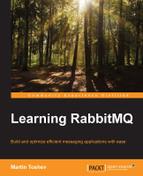RabbitMQ provides adapters for various other types of protocol in the form of RabbitMQ plugins. Such protocols include STOMP, MQTT, HTTP, Websocket, and others. Each adapter plugin follows a common usage pattern:
- The login information is passed in terms of the capabilities provided by the particular protocol to the RabbitMQ broker for authentication
- SSL support is provided for most of the protocol adapter plugins
- Adapter plugins expose TCP ports on which they accept the connection via the protocol that they implement, for example, by default, the STOMP adapter is configured to use 61613 (TCP) and 61614 (SSL), and for MQTT, these are 1883 (TCP) and 8883 (SSL)
- Adapter plugins use a particular syntax to specify the RabbitMQ endpoint elements such as exchanges, queues, and bindings that are used when protocol messages are translated to particular operations on the broker (such as subscriptions on the sending of messages to the broker)
You can install protocol adapter plugins with the rabbitmq_plugins utility. For example, the STOMP plugin comes with the RabbitMQ broker installation and must be enabled with the following command:
rabbitmq-plugins.bat enable rabbitmq-stomp
In case you want to use RabbitMQ directly from the browser using Websockets, you can additionally install the rabbitmq-web-stomp plugin, which is a bridge between a SockJS Websocket server and the rabbitmq-stomp plugin to communicate with the broker via Websockets. There is also a separate plugin called rabbitmq-web-stomp-examples that demonstrates the use of rabbitmq-web-stomp using a web browser.
